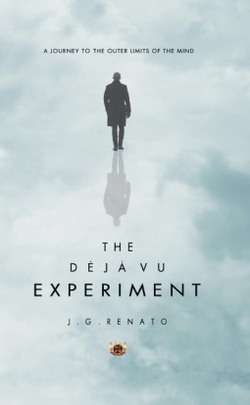
Reviewed for Readers’ Favorite.
* * * *
What might John Galt have thought if he had left his followers in the valley of Colorado? Would he have continued to follow the idea that only the material mattered? Or, might he have undergone a philosophical revelation? In The Déjà vu Experiement, J. G. Renat expounds upon this idea. The Déjà vu Experiment is not a “story.” It is, rather, a discussion of the little anomalies in life that may lead one to look at the world in a new way. These anomalies, these “gaps” were discovered and then examined by John Galt when he met Diana, an Iowa farm girl who encouraged his curiosity.
Renat suggests that people are so intent on their own internal realities that they fail to notice the greater world. He challenges them to “look through the veil” of their historical understanding. It is the strange little events that will wake people from their typical hypnotic approach to life, events often brought forth through art, theology and science. Living our “mortal dreams,” we miss out on an appreciation of the eternity in which we live, an eternity without past, present or future.
I especially appreciated the quotes Renat shared from Marianne Williamson; Albert Einstein; Jack Kerouac; the Chinese philospher, Zhuangzi; Tolstoy; and more. Some of his ideas encouraged my thoughtful consideration and challenged my understanding. For example, Renat suggests that if we operated just as spirit, if we knew of or immortality, “it would be tough to get a rousing game of life going.” He also asks, which is really in charge: you or your body? Offering unique ways to look at light, quantum physics, string theory, the universe existing as a single unified melody, the power of imagination, free will, the language of mathematics, death, and more, Renat successfully challenged me to consider not just “Who am I?” but “What am I?”
Also posted on GoodReads and on BookLikes, added to my FaceBook page and to two Google+ review groups, and tweeted. Cover pinned.
* * * *
What might John Galt have thought if he had left his followers in the valley of Colorado? Would he have continued to follow the idea that only the material mattered? Or, might he have undergone a philosophical revelation? In The Déjà vu Experiement, J. G. Renat expounds upon this idea. The Déjà vu Experiment is not a “story.” It is, rather, a discussion of the little anomalies in life that may lead one to look at the world in a new way. These anomalies, these “gaps” were discovered and then examined by John Galt when he met Diana, an Iowa farm girl who encouraged his curiosity.
Renat suggests that people are so intent on their own internal realities that they fail to notice the greater world. He challenges them to “look through the veil” of their historical understanding. It is the strange little events that will wake people from their typical hypnotic approach to life, events often brought forth through art, theology and science. Living our “mortal dreams,” we miss out on an appreciation of the eternity in which we live, an eternity without past, present or future.
I especially appreciated the quotes Renat shared from Marianne Williamson; Albert Einstein; Jack Kerouac; the Chinese philospher, Zhuangzi; Tolstoy; and more. Some of his ideas encouraged my thoughtful consideration and challenged my understanding. For example, Renat suggests that if we operated just as spirit, if we knew of or immortality, “it would be tough to get a rousing game of life going.” He also asks, which is really in charge: you or your body? Offering unique ways to look at light, quantum physics, string theory, the universe existing as a single unified melody, the power of imagination, free will, the language of mathematics, death, and more, Renat successfully challenged me to consider not just “Who am I?” but “What am I?”
Also posted on GoodReads and on BookLikes, added to my FaceBook page and to two Google+ review groups, and tweeted. Cover pinned.


